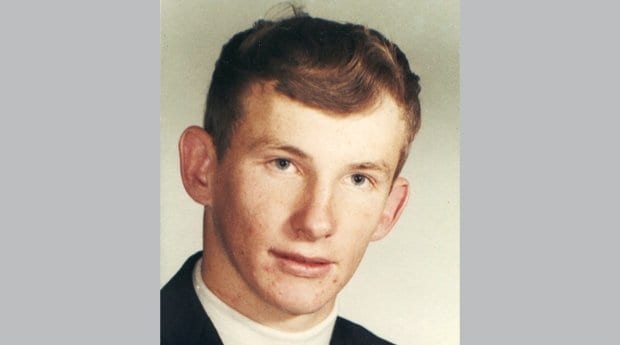
A young James Eton Devaleriola hails from a farm near Morrin, Alberta. Credit: Little Sister’s archives
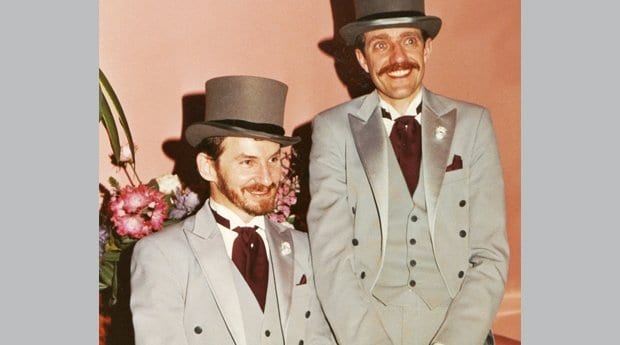
Partners Jim Deva and Bruce Smyth. Credit: Little Sister’s archives
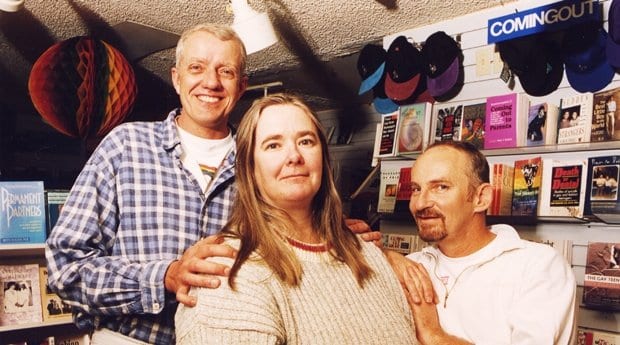
Bruce Smyth, Janine Fuller and Jim Deva gather at the store on Jan 19, 1996, to read the BC Supreme Court’s ruling on Canada Customs. Credit: Julie Stines
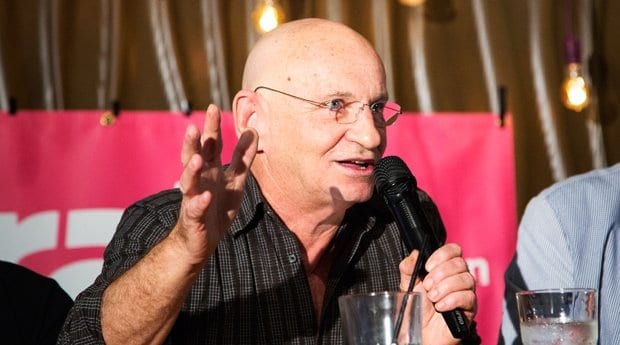
Jim Deva encourages everyone to be sexually honest at Xtra’s town hall on Sept 9, 2014. Credit: James Loewen
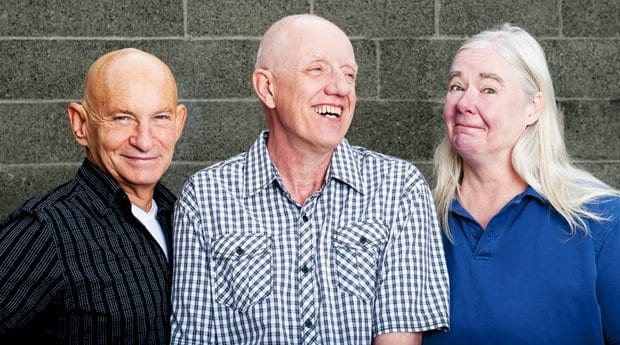
Jim Deva, Bruce Smyth and Janine Fuller pose for an Xtra photo-shoot to celebrate the 30th anniversary of Little Sister’s bookstore in 2013. Credit: belle ancell
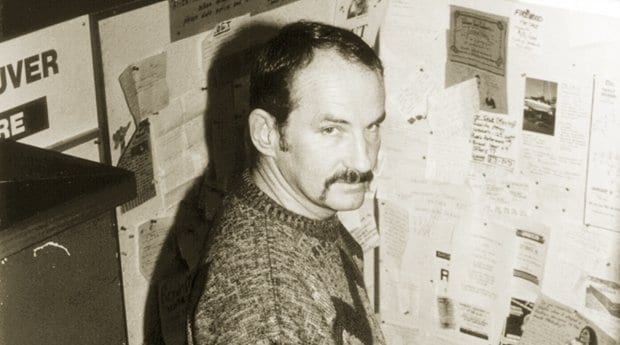
Jim Deva surveys the damage after a bomb is launched into the stairwell at Little Sister's first location on Thurlow Street. Credit: John Kozachenko
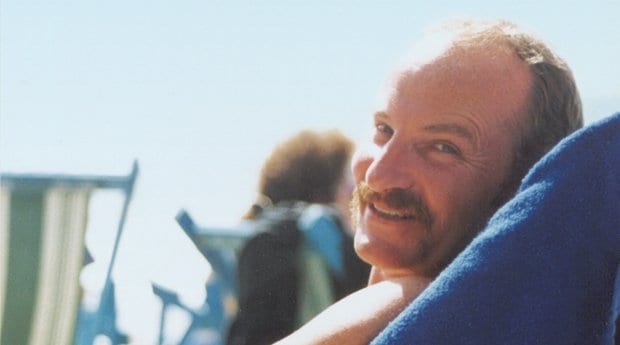
Jim Deva enjoying a moment of leisure. Credit: Little Sister's archives
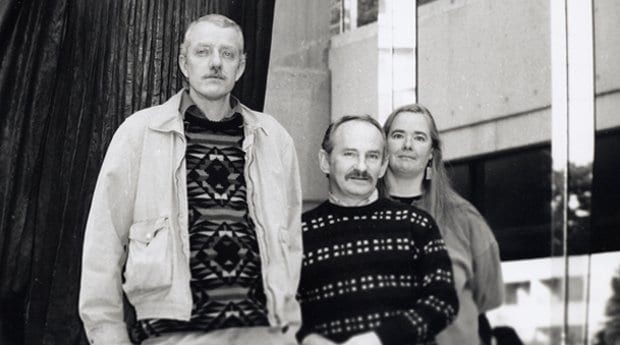
Bruce Smyth, Jim Deva and Janine Fuller wait for the Little Sister’s case to be heard in BC Supreme Court in 1994. Credit: Daniel Collins
When Jim Deva finally came out to Bruce Smyth, the man who would become his partner of 42 years, Smyth drove into a ditch.
“I said, ‘Oh my god, me too!’ We discovered together,” Smyth says.
It’s unlikely that the pair knew, in that moment of shared discovery, as Smyth fought to regain control of the car, just how pivotal a role they would play in the fight for gay liberation in Canada.
They weren’t even lovers yet.
Smyth and Deva had met several years earlier, in the grocery department of the Hudson’s Bay Northern Stores in Fort Simpson, NWT, where Deva arrived for a summer job partway through his education degree at the University of Calgary in 1972. Smyth says Deva took an instant dislike to him.
“He got so fucking pissed off at me that he asked for a transfer to dry goods in two days,” Smyth says, with a smile.
Despite the initial animosity, the two became close friends, then roommates in Calgary, and finally lovers. “What drew me to him was his laugh. We made each other laugh,” Smyth says. “It was easy.”
***
Jim Deva was born James Eton Devaleriola on Dec 10, 1950, on a farm near Morrin, Alberta. Smyth says Deva refused to go through life spelling such a long last name.
“That’s how we got our Deva,” he says. “I don’t think he even realized it was ‘diva’ at the time.”
As a child growing up on a prairie surrounded by land and animals, Deva relished the open spaces. He often described his childhood, with his four siblings and parents Ted and Doreen, as “idyllic.”
He later said his mother, an original supporter of Alberta’s social-democratic Co-operative Commonwealth Federation (CCF), instilled in him a passion for politics and the importance of fighting for what you believe in.
“My mother was very political,” he told Xtra’s Sept 9 town hall on the politics of being too openly sexual to run for elected office. “She was an original CCF woman in the heart of rural Alberta… She really instilled in me the importance of being an underdog and fighting for what’s important. Not to win; it’s because it’s the point of the thing, it’s the issue of the thing. It’s because you should be strong and vote for what you totally, totally believe in. So that sort of runs through my entire body.”
Deva would bring that passion for principle, that determination to fight for what he believed in, to the bookstore that he and Smyth opened in 1983, in an upstairs corner of Vancouver’s then-emerging gay village.
The couple had moved to Vancouver five years earlier, where they settled into a Jervis Street apartment and each worked a variety of jobs, with Deva subbing as a teacher. But it was a difficult time to be a gay teacher. When some students ran into him at the old Gandydancer club on Hamilton Street, he quit.
“I decided I didn’t want to be a closeted teacher,” he told Xtra in 2002. Instead, he took a retail job at a game store in Gastown. “I knew really deeply and intrinsically that I had to close the door on the past to start a new life.”
***
By the early 1980s, Deva and Smyth were living in a communal house with four other people, bandying about business ideas.
“We didn’t know anything about running a bookstore, but it drove us crazy that you couldn’t find gay or lesbian books,” Deva told Xtra 25 years after he and Smyth opened the bookstore that would embolden generations of gay, lesbian, bisexual and transgender people to tell their stories and to fight any attempt to silence them.
Within two years of opening its doors on April 15, 1983, Little Sister’s Book and Art Emporium was being targeted regularly by border officials at Canada Customs, who seized shipment after shipment of gay and lesbian books and magazines bound for the store, leaving its shelves increasingly bare and jeopardizing its very ability to survive as a business.
Deva had been warned to fly under Customs’ radar by porn importers whose advice he sought prior to opening the bookstore. If a shipment gets seized, just let it go, they told him; challenging Customs would only bring unwanted attention to the store.
But Deva and Smyth couldn’t just let it go. They couldn’t afford to run a business without stock, and, more profoundly, they couldn’t stomach the state’s censorship of gay and lesbian books. They had a decision to make.
On Dec 10, 1986, after Customs seized the bulk of the store’s critical Christmas inventory, Deva and Smyth publicly fought back. They put out a press release: “Canada Customs Declares War on Little Sister’s.”
Customs eventually relinquished the Christmas shipments, dumping the books on the store’s Thurlow Street steps, stuffed into a mailbag. (“They just threw them on the step like it was trash,” Deva said.) But the seizures continued unabated.
So Little Sister’s took Big Brother to court, as filmmaker Aerlyn Weissman put it in her 2002 documentary Little Sister’s vs Big Brother.
***
Jim Deva taught us to break the silence, to speak our truths, to challenge censorship and to live our lives freely, Weissman said in her eulogy to him, Sept 27.
“His refusal to bow to injustice and censorship was fuelled not by bitterness or hatred for his adversaries, but for love of his community,” she continued. “And by the knowledge, deep in his gut, that the struggle was absolutely necessary, for his own dignity and well-being and for the dignity of lesbian and gay and bisexual and transgender and two-spirited people everywhere.”
Drew Dennis, executive director of the Vancouver Queer Film Festival, still remembers the standing ovation that Deva, Smyth and the Little Sister’s team received from a sold-out audience when Weissman’s film screened in 2002 — despite attempts by BC’s Film Classification Board to shut it down. “And this was before the film had even started! We owe so much to Jim and the Little Sister’s family for the access to queer stories, whether it be in book or on the screen, that we enjoy today. And when I say ‘we,’ I mean all Canadians,” Dennis says.
“They were the forward guard, the knights of our community,” Weismann says. “They took up the flag and said, ‘We’re not going to live in shame.’ They said, ‘We need our lives and our literature just like the rest of you folks.’”
The bookstore refused to back down, despite legal delays, mounting court costs, government appeals and even three bombs (see timeline on this page). More than a decade after Little Sister’s first filed suit against Canada Customs, the Supreme Court of Canada handed down a partial victory in 2000. The court upheld the government’s power to censor ideas it deemed obscene but told border officials to stop unduly targeting gay and lesbian books.
Less than a year later, border guards again seized several books of gay erotica on bondage and fetish destined for Little Sister’s. Deva and Smyth marshalled their energy and filed suit again, though the case would eventually fizzle because of lack of funds.
***
Throughout the court battles and to this day, the bookstore remains a hub, a de facto community centre, where people gather to gossip, to find out what’s going on, to support one another and to build community.
From the store’s earliest days, its character was inextricably entwined with its owners, Deva and Smyth, who literally lived at work, sleeping in a tiny room at the back.
With a smile on his face, Deva welcomed community members to chat, play pinball or drink coffee. Off to the side was the folding door through which could be seen Deva and Smyth’s rumpled bed, Little Sister the cat (and store namesake) curled up asleep.
Manager Janine Fuller remembers her first few days on the job in 1990. “When I first worked at the bookstore, there was a coffee machine that you had to put a quarter in and press a button. It was hysterical. They sold cigarettes and everyone smoked,” she told Xtra on the store’s 25th birthday.
“Entering the bookstore was like entering a carnival,” she and Stuart Blackley wrote in their 1995 book Restricted Entry: Censorship on Trial, about the store’s fight against Canada Customs. “Every aisle was a sideshow displaying the ideas and trends of the times — with moods, depending on the aisle, that could be sexy, thoughtful or euphoric.”
Underpinning the bookstore’s philosophy was its unapologetic exploration and celebration of sex. Deva encouraged us to talk about our desires and to enjoy our sexuality without shame, says journalist Kevin Dale McKeown, who wrote Vancouver’s first gay column in the early 1970s.
Little Sister’s has always been an important bookstore and sex shop, he says. “It was where you went to get your lube and poppers and masks. We gussy it up with rhetoric, [but] the day-to-day business of Little Sister’s was about the sex, with no apologies.”
Only a few weeks before his death, Deva cheerfully praised masturbation and encouraged everyone to be sexually honest at Xtra’s town hall. “Masturbation is a really healthy thing to talk about,” he said. “Society would be a lot better and a lot more healthy if it actually talked about sexual issues. You know, we as queer people have been doing this for a long time. And this is one of the things that we have to take on: we have to be sexually honest with each other and with society. It’s extremely important for the sake of all society.”
Three years ago, Deva and Smyth expanded their sexual outreach to straight people eager to embrace their own sexuality, when they launched their spinoff store, Sweet Adult Boutique, on Broadway Avenue. Sweet’s stock is primarily sex toys, lubricants and massage oils, and its clientele is primarily straight. “I feel like an apostle, but to straight people,” Deva told Xtra last year. “I’m giving workshops on how to fuck your husband, and it’s being very well received, and I think I’m doing some good in the world,” he laughed.
“Jim supported everyone who was striving to find their identity,” McKeown says. “Jim would always make sure there was room for the contrary voice,” he adds.
***
Back at the flagship store, Little Sister’s remains an integral part of the coming-out journey for countless LGBT people, many of whom consider it a rite of passage to walk through the door.
Like so many others, activist Ryan Clayton set out to meet Deva, and to find those long-denied books. He was 18 when he first entered Little Sister’s in nervous hopes of meeting the man he knew as a legend. “I described it as a pilgrimage for the gay soul,” Clayton, now 27, says.
It was Deva who first encouraged Clayton to address a crowd, at an anti-gaybashing rally in 2008. “I don’t think anything I ever did didn’t have his influence,” Clayton says. “He’s left a legacy all across Canada.”
Activist Yogi Omar first met Deva when he sang with a gay and lesbian youth choir, but it wasn’t until he came out in 2011 that he was taken to Little Sister’s. Later, he talked to Deva about wanting to become involved in activism. “He said, ‘You already are. You’re thinking about it,’” Omar remembers. “He said, ‘Learn your past. Learn the rules… so you know how to break them.’”
Without exception, the bookstore has “welcomed everyone and every part of our community and been a home to all of us,” Weissman says.
Deva had a way of making everyone feel heard, she says. “He was so full with love. How could you not love him? He was such a wonderful, open and funny person, his ears and his heart ever open to everyone. Everyone felt heard. Everyone felt included.”
He also had a gift for harnessing people’s outrage and empowering them to speak out and lead others.
When Aaron Webster was killed in Stanley Park by a group of youth on Nov 17, 2001, it was to Deva that Murray Bilida immediately turned.
Bilida was eating his breakfast sandwich at Melriches Coffeehouse when he heard about the brutal attack at the entrance to the park’s gay cruising trail. He knew instantly that it was a gaybashing and hurried next door to see Deva.
“Can you fucking believe this?” he asked Deva.
“‘Somebody needs to do something about this,’” Bilida says he told Deva. “And Jim, in his wise and succinct way, said, ‘Well then, you better get busy, mister.’
“And that was it. I went home and I got to work,” says Bilida, who organized the following day’s historic protest down Davie Street in less than five hours.
“He drew lines and connected dots that I don’t think a lot of people contemplated,” Bilida says.
Webster’s murder served as another catalyst for Deva, who, in the aftermath, pushed for better protection for the community from the Vancouver Police Department and helped form a liaison committee to sensitize the force. He also pushed for more community representation on the gay village’s business association on Davie Street and anti-homophobia programs in schools. As the police and city hall grew more attentive to the community, he later sat on the City of Vancouver’s new LGBTQ advisory committee as well.
“He was a champion for the West End community, for the Davie Village,” Weissman says. “He was a liaison to the Vancouver Police Department, building respect and understanding for lesbian, gay, bisexual, transgender and two-spirited people.”
Vancouver Mayor Gregor Robertson recognized Deva as a “city builder” in his eulogy. “It’s impossible to imagine what our city would be like today if it had not been for Jim,” said a visibly moved Robertson, who called Deva a trailblazer who knew how to fight and, even more, how to love. “All of us here and so many who could not be here today — countless people — are really a testimony to Jim’s work,” he said.
“Jim is a city builder,” he continued. “Someone who has built an incredibly powerful culture of love and understanding, of fighting for justice, of creating a city of leaders who look after each other.”
Longtime friend Barb Snelgrove, who still sits on the city’s LGBTQ advisory committee, calls Deva a true champion. “He was a warrior,” she says. “He was fierce, he was soft, he was a pit bull, he was a saint. He was impassioned and a true wit. He was all the best of things I love in a person.”
“All any of us can do is take what he taught us as we try to carry his torch forward. Work with compassion, humour, commitment and a deep love of community,” she says.
***
Svend Robinson, Canada’s first openly gay member of Parliament, says news of Deva’s death left him reeling.
“I remember his passion, his decency, his wicked laugh, his unwavering commitment to justice and equality, not just for our LGBT people, but for all,” he says, reached in Europe.
“He gave hope and inspiration to so many young gay, lesbian, bi and trans kids… and to people like me,” Robinson says. “He was truly a hero.”
Hero is a word that Deva himself shied away from. “I do have trouble with the word hero,” he said on the eve of receiving Xtra’s Community Hero of the Year award in 2002. “I sort of view myself as a conduit, empowering people to be active. We have so many brilliant, accomplished people in our community, and once in a while they just need to be empowered.”
Asked what drove his partner through all the years, all the battles and all the growth, Smyth is succinct. “The community,” he says, stroking their dog Buddy’s head. “The store was only an instrument to help the community.”
“More than anything else, Little Sister’s represents the power of community,” Deva concurred in 2013, as the store celebrated its 30th anniversary. “Little Sister’s has never just been about one person, or two, or three, or four. It’s always been about community.”
Deva was trimming bamboo in the garden of his Haro Street home when he fell Sept 21, hitting his head. He died instantly, triggering a wave of grief across Canada. He was 63 years old.
As news of his death swept across social media and stunned Vancouver’s queer community, people piled sunflowers outside the store’s door, while, inside, Deva’s friends and family stared at each other in disbelief.
“I spent 42 fabulous years with the man. I have no regrets,” Smyth says. “We said everything we needed to say.”
“It’s always been an exquisite ride,” Deva told Xtra in 2002. “I compare it to a roller coaster, where you hold on to the bar and go for it.”
Censorship & bombs: A history of Little Sister’s determination
By Guy Cribdon, with files from Robin Perelle
1983
April 15:Jim Deva, Bruce Smyth and Barb Thomas open Little Sister’s Book and Art Emporium at 1221 Thurlow St in Vancouver and hold their official opening two weeks later on May 3. The store’s bookshelves and art gallery initially share space, but art sales are slow and the bookstore soon takes over, despite the popularity of the monthly gallery openings. Since very few gay and lesbian books are available at this time in Canada, Little Sister’s has to import about 90 percent of its stock from the US.
1985
May 29:Canada Customs seizes a shipment of the lesbian magazine Bad Attitude destined for Little Sister’s. Customs officials will not say why the publication has been seized but inform Little Sister’s that it can fill out the requisite forms to appeal the decision.
June:The federal Department of Justice releases Memorandum D9-1-1, itemizing exactly what kinds of material should be considered obscene and stopped at the border. Materials deemed to be obscene will be seized and destroyed by the government; items passing inspection will be forwarded to their destination. The guidelines include depictions or descriptions of anal sex as grounds for prohibition.
1986
Dec 8: Canada Customs seizes 59 titles headed for Little Sister’s for the busy Christmas season. Two days later, officials seize another 19 titles, including 75 copies of the Jan 3, 1987, issue of The Advocate. Little Sister’s appeals the seizures and goes public, issuing a press release entitled “Canada Customs Declares War on Little Sister’s.” Press coverage of the seizures notes the ready availability of many of the detained titles through other bookstores and the Vancouver Public Library. By the end of the month, Customs has seized more than 600 books and magazines bound for the store, at least $4,000 worth of merchandise.
1987
May:Little Sister’s and the BC Civil Liberties Association launch proceedings against Canada Customs for the detention of two issues of The Advocate. The trial date is set for May 1988.
June 3:Customs detains a shipment of books, including Anne Cameron’s book Dzelarhons, destined for Little Sister’s. The popular Canadian title, a retelling of northwest coast First Nations legends, is deemed obscene because of the presence of one short story that recounts the story of a woman who is forced to marry a bear. Customs releases the book later in the month.
Dec 9:A bomb is thrown into the stairwell leading up to Little Sister’s from its Thurlow Street entrance. No one is in the stairwell when it explodes, but police estimate the bomb has caused $2,000 in damage.
1988
Feb 6:At 8:45pm, a bomb is thrown through the back door of Little Sister’s downstairs neighbour Thurlow’s Restaurant while Jim Deva dines with co-owner Gaston Nadeau. Broken glass showers the diners, but press reports maintain that no one is seriously hurt.
April:Just weeks before their case against Canada Customs over the 1986 seizure of The Advocate is set to get underway, Little Sister’s and the BC Civil Liberties Association learn that the federal government has conceded that the LA-based biweekly newsmagazine is not obscene after all. The case is closed. Seizures of other gay and lesbian materials destined for Little Sister’s continue.
1990
June 7:Little Sister’s and the BC Civil Liberties Association file a new statement of claim in BC Supreme Court challenging Canada Customs’ powers to detain and ban books as unconstitutional, violating the Canadian Charter of Rights and Freedoms’ guaranteed right to freedom of expression. The trial date is set for September 1991 but will be postponed three times.
1992
Jan 7:A smoke bomb explodes in the stairwell leading up to Little Sister’s at about 10pm, while the store is still open. Smoke fills every corner of the store. No one is injured, but there is considerable damage to the floor of the landing and stairwell walls. Remains of the bomb are soon discovered embedded in the notice board on the stairwell turn. It’s a Polish percussion grenade, military issue. No one claims responsibility and no one is ever arrested.
September:Little Sister’s Charter challenge versus Canada Customs is postponed for a year just one week before its planned start date. It is now scheduled to begin on Oct 4, 1993.
1993
Sept 12:Delegates attending the 60th International Congress of PEN, the international writers’ union, pass a resolution in Valencia, Spain, condemning Canada Customs’ seizure of books as a violation of the fundamental right to freedom of speech.
Sept 27:BC Supreme Court Justice R Bruce Harvey agrees to the federal government’s request to adjourn the start of the Little Sister’s trial. Lawyers representing the government argue that they need more time to prepare their case. The trial is rescheduled to commence on Oct 11, 1994. This is the third time the case has been adjourned since Little Sister’s and the BC Civil Liberties Association filed suit in 1990.
Nov 29:Canada Customs intercepts a shipment of copies of Gael Baudino’s Shroud of Shadow, sent to Little Sister’s by Penguin Books Canada in Newmarket, Ontario. This is the first instance of Customs detaining a domestic shipment of materials destined for Little Sister’s. Customs releases the books and sends them on to Little Sister’s in early December and claims, along with Canada Post, that the incident was a mistake. Federal revenue minister David Anderson apologizes to Little Sister’s.
1994
Aug 25:Customs detains 10 titles on their way to Little Sister’s, including the children’s book Belinda’s Bouquet.
Sept 29:Just two weeks before Little Sister’s Charter challenge against Canada Customs is finally scheduled to be heard, the federal government amends Memorandum D9-1-1 to remove depictions of anal penetration from the list of obscene materials banned from importation into Canada.
Oct 11:More than four years after filing its statement of claim, Little Sister’s case against Canada Customs finally opens in BC Supreme Court. The trial will run for 40 days and feature testimony from such literary luminaries as Pierre Berton, Jane Rule, Nino Ricci and Pat Califia in support of Little Sister’s.
1995
Feb 24:A male caller phones Little Sister’s from out of town and warns Janine Fuller that a bomb has been planted in the store. Police investigate but find no explosive device.
March 1:Staff at Little Sister’s receive a hand-written letter threatening them with “a day of reckoning” and warning them to stay away from work the next day.
1996
Jan 19:The BC Supreme Court renders its decision in the Little Sister’s case. Justice Kenneth Smith rules that Canada Customs has discriminated against Little Sister’s and enforced the law with “arbitrariness, inconsistency and just plain foolishness.” However, the court upholds Customs’ power to seize and detain material. Little Sister’s and the BC Civil Liberties Association vow to appeal the decision.
March 29: Justice Kenneth Smith grants an injunction requiring Canada Customs to stop its seizures of Little Sister’s material until the Crown can prove to the court that Customs officers are applying “appropriate standards” in their examinations of Little Sister’s material. In separate proceedings, Justice Smith also awards Little Sister’s costs to a total of $168,740 plus disbursements, a significant victory for the bookstore.
July 7Little Sister’s opens at its new location, 1238 Davie St, having run out of space at its old Thurlow Street location.
1998
March 28:Little Sister’s appears in the BC Court of Appeal to contest the BC Supreme Court ruling in its case against Canada Customs.
June 24:The BC Court of Appeal, in a 2-1 decision, upholds the BC Supreme Court decision and rules that Canada Customs’ power to seize and detain material its officers deem obscene is not unconstitutional. Janine Fuller announces that Little Sister’s will appeal to the Supreme Court of Canada.
1999
Feb 18:The Supreme Court of Canada agrees to hear Little Sister’s appeal. The bookstore hopes the nation’s highest court will strike down the laws permitting Canada Customs officers to seize and detain material they deem obscene at the Canadian border.
2000
March 16:The Supreme Court of Canada hears arguments in the Little Sister’s case.
Dec 15:The Supreme Court of Canada upholds Justice Smith’s BC Supreme Court decision and rules that Little Sister’s suffered “excessive and unnecessary prejudice in terms of delays, cost and other losses in having their goods cleared (if at all) through Canada Customs.” The court orders Canada Customs to stop targeting the gay bookstore, but it does not strike down Customs’ authority to seize materials deemed obscene at the border.
2001
July 5: Less than a year after the Supreme Court of Canada ruling, Customs seizes two issues of the gay comic book Meatmen. This act, followed by the subsequent seizure of two more books of gay erotica (Of Slaves and Ropes and Lovers and Of Men, Ropes and Remembrance, edited by Larry Townsend), prompts Little Sister’s and the BC Civil Liberties Association to launch new proceedings against Canada Customs.
2004
June 18:BC Supreme Court Justice Elizabeth Bennett awards Little Sister’s advance costs to pursue its Meatmen lawsuit against Canada Customs. Judges have the discretion to award advance costs in rare and exceptional cases of public significance where the appellants lack the financial means to proceed. “The issues raised are too important to forfeit this litigation because of lack of funds,” Bennett rules.
2005
Feb 18:The BC Court of Appeal reverses Justice Bennett’s ruling, which would have granted Little Sister’s the advance funding necessary to carry on its legal proceedings against Canada Customs. Little Sister’s and the BC Civil Liberties Association appeal to the Supreme Court of Canada.
2007
Jan 19:The Supreme Court of Canada rules that Little Sister’s case against Canada Customs is not special enough to warrant the taxpayers’ support and denies the store’s request for advance funding. The ruling is a blow to Little Sister’s ability to take Customs back to court. Without advance costs, the bookstore can’t pursue its complaint.
2008
January:While making plans to celebrate the 25th anniversary of Little Sister’s, Jim Deva and Bruce Smyth announce their plan to sell the store, but they never do. Though a few offers are received, none meet the co-owners’ requirement to maintain the staff, the store and its role in the community. Instead, Deva and Smyth launch a second store in 2011, called Sweet Adult Boutique, aimed primarily at liberating a straight clientele.
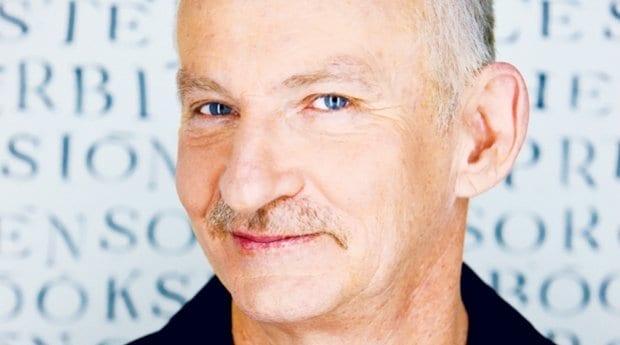
 Why you can trust Xtra
Why you can trust Xtra


